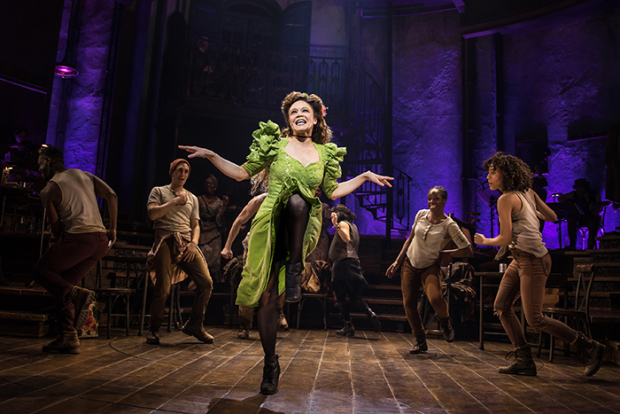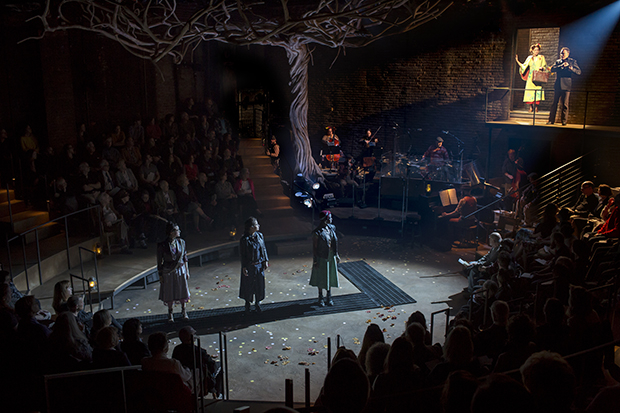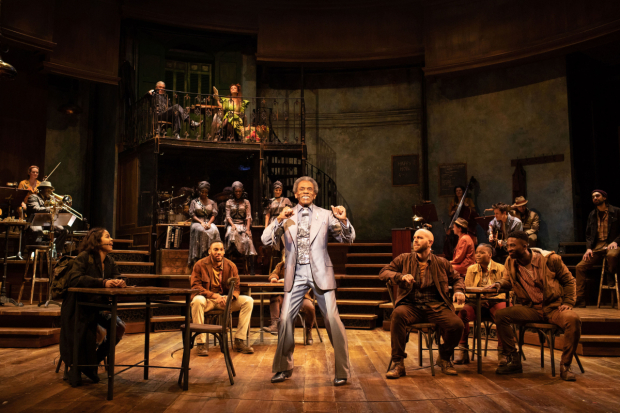Anaïs Mitchell Reflects on the Journey of Writing Hadestown
Mitchell explores the evolution of her Tony-winning musical in her new book, ”Working on a Song”.
Singer-songwriter Anaïs Mitchell was relatively unknown in the theater scene when her musical, Hadestown, began performances at New York Theatre Workshop in 2016. Originating as a concept album in 2010, the Hadestown journey has since taken Mitchell from Vermont to Canada's Citadel Theatre to London's National Theatre, and finally, to Broadway's Walter Kerr Theatre, where the show was in the middle of a Tony-sweeping run when it was shutdown in March due to the Covid-19 pandemic.
In the meantime, while we wait for Broadway to get back on its feet, Mitchell has written a new book about her decade-long experience of crafting the show. Working on a Song: The Lyrics of Hadestown provides readers with not just the full Broadway lyrics, but cut moments, revised wording, and copious notes on how each song evolved into its final form. Purchase the book by clicking here.
Over email, Mitchell discussed the emotional experience of writing the book, and tells us what it was like for her to relive this 10-year journey in print.

(© Seth Walters)
When during the Hadestown journey did you decide that you were going to write a book about writing the show?
It didn't cross my mind until after the show was up on Broadway. Plume Books approached me about publishing the lyrics as they appear on Broadway. I thought about it and realized that I was excited to do that but that I was really excited to share some of the older, discarded versions of the lyrics. And in order to do that, I needed to provide some context by writing notes on how and why things changed the way they did. Suddenly I was writing a book!
What were your goals for the book, and how did they evolve over the course of writing?
To be honest, I think at first I was writing this book for myself. Kind of me doing therapy with myself about what the hell happened to the last several years of my life as I rewrote and rewrote this one story. And also, a little home to put some of my beloved "orphans," the name I gave any lyrics I loved poetically but couldn't find a home for dramatically.
But as the book evolved, I began to imagine who else might be curious about my/our process. There was such a learning curve for me, as a songwriter coming from the music world and getting this crash course in dramatic songwriting. I was lucky to be surrounded by brilliant and supportive collaborators, and they're a big part of why things evolved as they did. But there were also a lot of lonesome hours at the writing desk. I hope this book can be of use to artists who are struggling in pursuit of a vision.

(© Matthew Murphy)
As a writer, what were your emotions when you went back to your old drafts of the show and willingly published versions of what certain songs once were, alongside the "finished" products?
Lots of ups and downs! Some of the old lyrics I published are ones I loved and even mourned the loss of, so I'm so glad to share them! Others are highly embarrassing but it seemed important to share them too. What emerged for me though was a kind of peace with the messy process of making art. I used to think a line was "wrong, wrong, wrong" until suddenly I hit upon one that was "right." Now I see that the "wrong" lines exist in the DNA of the show as well. I think of the "right" line as the blooming flower and all the other failed attempts as the roots of that flower, unseen but absolutely necessary.
What was the hardest lyric for you to lose over the course of this process, and do you still feel a twinge of sadness when you see or hear the show and it's not there?
The "Epics" are the songs that gave me the most emotional distress in the process of writing and rewriting Hadestown. But one simple moment that I really miss was the Persephone verse in "Chant 2." I rewrote it many times and for Broadway I finally got it someplace that felt right, poetically and thematically. My favorite part went like this: "Even where the bricks are stacked / Love is blooming through the cracks / Even when the light is gone / Love is reaching for the sun / It was love that spun the world / When I was a young girl." Ultimately we cut the entire verse because we were plagued by a sense that our second act was long and meandering just at the moment when we needed the audience to lean forward.

(© Joan Marcus)
How many of the show's lyrics were inspired by the actors you cast? Are there lyrics that are only there because you saw people like Eva Noblezada, who plays Eurydice on Broadway, or Chris Sullivan, who played Hermes at New York Theatre Workshop, or Ani DiFranco, who sang Persephone on the concept album, in rehearsal for the various incarnations of the show and were inspired by them?
Yes! I've been deeply inspired by everyone who has sung these roles, it was very motivational to try to write for a particular voice, or a particular personality. What a joy to see a singer or actor really sink their teeth into a lyric. Chris Sullivan even came up with one of the Hermes lyrics in "Wait for Me Intro." I had written it "Another way? / Around the back / But that ain't a easy road to walk" and he was at home practicing when he texted me a voice memo of himself going: "Around the back / But that ain't easy walkin', jack." It was weirdly perfect for the Hermes character. When he left the show for television glory [on This Is Us][ I asked if we could keep "easy walking jack." He said "he's yours!" and I can't picture it any other way.
I know choosing between songs is always so hard for writers, but do you have a favorite from among the Hadestown score?
Hmm. For me, "Wait for Me" really became a high-water mark for the synthesis of music, poetry, and drama, and the work of every single Hadestown collaborator is extraordinary and kind of comes together for a common purpose in that scene. The orchestrations, the vocal arrangements, the set breaking apart, the lighting, Rachel's swinging lamps, the whole event. I can't separate the song from all those other elements in my mind.
How tired of you are having to explain that "Why We Build the Wall" was written in 2006?
Oh man, I know. Let's hope that its uncanny resonance with a certain leader's border wall project will be obsolete next year.

(© Helen Maybanks)









